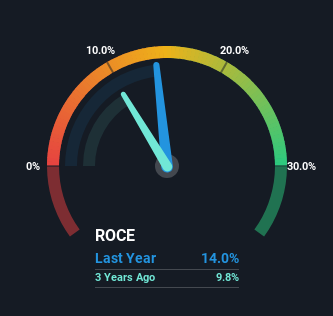Stock Analysis
- United States
- /
- Hospitality
- /
- NYSE:WH
Returns On Capital Signal Tricky Times Ahead For Wyndham Hotels & Resorts (NYSE:WH)

Finding a business that has the potential to grow substantially is not easy, but it is possible if we look at a few key financial metrics. Firstly, we'll want to see a proven return on capital employed (ROCE) that is increasing, and secondly, an expanding base of capital employed. If you see this, it typically means it's a company with a great business model and plenty of profitable reinvestment opportunities. However, after investigating Wyndham Hotels & Resorts (NYSE:WH), we don't think it's current trends fit the mold of a multi-bagger.
What Is Return On Capital Employed (ROCE)?
If you haven't worked with ROCE before, it measures the 'return' (pre-tax profit) a company generates from capital employed in its business. The formula for this calculation on Wyndham Hotels & Resorts is:
Return on Capital Employed = Earnings Before Interest and Tax (EBIT) ÷ (Total Assets - Current Liabilities)
0.14 = US$515m ÷ (US$4.1b - US$405m) (Based on the trailing twelve months to March 2023).
Thus, Wyndham Hotels & Resorts has an ROCE of 14%. In absolute terms, that's a satisfactory return, but compared to the Hospitality industry average of 9.1% it's much better.
View our latest analysis for Wyndham Hotels & Resorts

In the above chart we have measured Wyndham Hotels & Resorts' prior ROCE against its prior performance, but the future is arguably more important. If you're interested, you can view the analysts predictions in our free report on analyst forecasts for the company.
SWOT Analysis for Wyndham Hotels & Resorts
- Debt is well covered by earnings.
- Dividends are covered by earnings and cash flows.
- Earnings declined over the past year.
- Dividend is low compared to the top 25% of dividend payers in the Hospitality market.
- Annual earnings are forecast to grow for the next 3 years.
- Good value based on P/E ratio and estimated fair value.
- Debt is not well covered by operating cash flow.
- Annual earnings are forecast to grow slower than the American market.
What Can We Tell From Wyndham Hotels & Resorts' ROCE Trend?
On the surface, the trend of ROCE at Wyndham Hotels & Resorts doesn't inspire confidence. To be more specific, ROCE has fallen from 18% over the last five years. On the other hand, the company has been employing more capital without a corresponding improvement in sales in the last year, which could suggest these investments are longer term plays. It's worth keeping an eye on the company's earnings from here on to see if these investments do end up contributing to the bottom line.
In Conclusion...
To conclude, we've found that Wyndham Hotels & Resorts is reinvesting in the business, but returns have been falling. And investors may be recognizing these trends since the stock has only returned a total of 24% to shareholders over the last five years. So if you're looking for a multi-bagger, the underlying trends indicate you may have better chances elsewhere.
Wyndham Hotels & Resorts does come with some risks though, we found 3 warning signs in our investment analysis, and 1 of those doesn't sit too well with us...
While Wyndham Hotels & Resorts may not currently earn the highest returns, we've compiled a list of companies that currently earn more than 25% return on equity. Check out this free list here.
Valuation is complex, but we're helping make it simple.
Find out whether Wyndham Hotels & Resorts is potentially over or undervalued by checking out our comprehensive analysis, which includes fair value estimates, risks and warnings, dividends, insider transactions and financial health.
View the Free AnalysisHave feedback on this article? Concerned about the content? Get in touch with us directly. Alternatively, email editorial-team (at) simplywallst.com.
This article by Simply Wall St is general in nature. We provide commentary based on historical data and analyst forecasts only using an unbiased methodology and our articles are not intended to be financial advice. It does not constitute a recommendation to buy or sell any stock, and does not take account of your objectives, or your financial situation. We aim to bring you long-term focused analysis driven by fundamental data. Note that our analysis may not factor in the latest price-sensitive company announcements or qualitative material. Simply Wall St has no position in any stocks mentioned.
About NYSE:WH
Wyndham Hotels & Resorts
Wyndham Hotels & Resorts, Inc. operates as a hotel franchisor in the United States and internationally.
Second-rate dividend payer and slightly overvalued.

